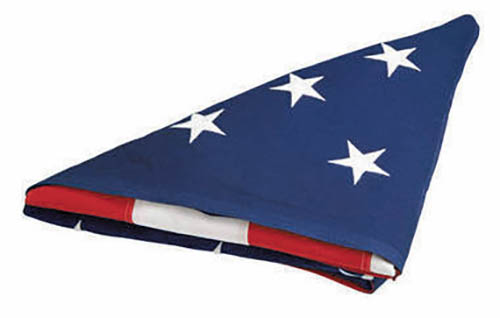
In the spring of 2004, a color guard honored Sam Cohen, my deceased father-in-law, with a somber, dignified salute.
Sgt. Samuel Cohen served in a medical capacity in France, landing there in the days following Normandy.
He and his one and only, Shirley, my mother-in-law, were living their retirement years in Surprise, Arizona, when he passed away.
The color guard meticulously folded the American flag draped over Sam’s coffin and presented it on “behalf of a grateful nation” to Shirley and her two daughters, my wife Lisa and her sister Susan.
This past March, Shirley, now living in Baltimore, suffered a broken neck when falling in her new apartment, the very day she was moving in. In the weeks since, Shirley, 86, had to have her neck surgically repaired. She has spent hours of dogged determination with the aim of getting back to her new apartment.
During those weeks while Shirley was in rehab, Lisa and I would open boxes, break them down and dispose of them and find an appropriate place within the new apartment to place or store them. My mother-in-law had her life packed away in well over 100 boxes. Our goal was for her to return to a home that was in move-in condition.
Sam Cohen never talked much about his WWII service. I would ask him from time to time to let me interview him about his experiences. He had seen so much that he just didn’t want to “go back there ever again.”
A few years before the stroke would take him from us, my wife and her mother decided to go shopping together. Sam stayed at home with me, and we’d planned to watch a game on TV. Instead of switching on the TV, I was focused with the knowledge that Memorial Day was coming up. I wanted to know what Sam knew, what he saw and held closely inside to himself. I figured I’d give it a try and without our wives around I asked him to at least tell me what Memorial Day meant to him.
He didn’t share a great deal. But what he did tell me over and over again was that he “left” a lot of friends behind, meaning they were dead or missing in action. This is why he didn’t even want to mentally revisit France. Sam would end up giving me a scrapbook he put together during the war complete with newspaper clippings in both English and French, a ration book and photos of the hospital his infantry group had taken back from the Nazis and a military-issue siddur he used for davening. As a kohen, he took it upon himself to be as active as possible in Jewish military life as long as the war kept him in France.
By the end of last week, my wife and I had opened more than our share of boxes, took layers and layers of cardboard and paper to the recycling dumpster and tried to put Shirley’s home back together as best as possible.
My mother-in-law came home from rehab last weekend. Before she came home, we did the last touches; we put food in the fridge, vacuumed and even taped her name to the front door.
We decided we had time to open a couple more boxes before we had to get home for Shabbos.
In one box we found a dried floral arrangement, and in another we found family pictures and other artwork.
There was one last box my wife opened. In it, triple wrapped in newsprint, was a wooden pyramid-shaped box. She removed the paper to find the folded American flag given to my mother-in-law on the day of Sam’s funeral some 12 years ago.
It stopped us in our tracks. We took it and placed it on top of the cabinet it had sat on in Shirley’s former home.
Our unpacking, I felt, was completed.
It happened during the days leading to Memorial Day, bringing back memories of Sam Cohen, my father-in-law, my friend, my confidant, the man who to this day set such a high bar on how a husband should love and respect his wife. For almost 40 years of marriage to his oldest daughter, Lisa, I still hope that Sam is proud of me and I take my relationship with him as seriously today as the day he and Shirley walked Lisa down the aisle to me under the chuppah.
May your Memorial Day give you pause to remember those whom you love, whether they are still with you today or if they are loved ones or comrades in arms who, as Sam put, were left behind, paying the ultimate price.
By Phil Jacobs













